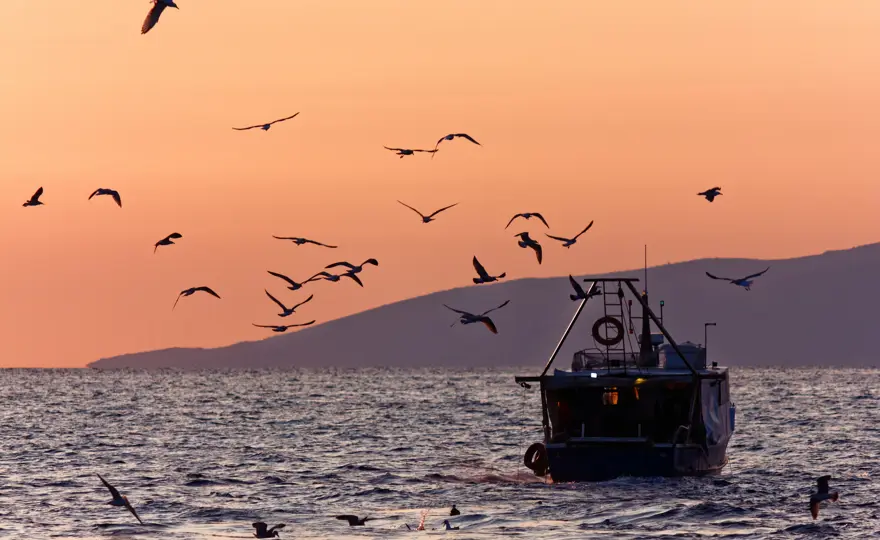ClientEarth Communications
7th June 2021


Seafood is currently a crucial part of the diet of countless people worldwide and a major source of income for coastal communities. But the health of our ocean is in immediate danger. This is not just because of pressures like climate change and pollution – it’s most directly because of the way we fish, and the scale on which we do it. That puts fish, fishers and our planet in jeopardy. So what can we do?
We asked Jenni Grossmann, ClientEarth’s science and policy advisor on fisheries, about the power of the law to protect the ocean.
Worldwide, an estimated 34% of fish stocks are being fished beyond sustainable limits – and that’s just where data is available. In Europe, this number goes up to 90% in the Mediterranean Sea, 87% in the Black Sea, and about 38% percent in the North East Atlantic and Baltic Sea. In short, world leaders are failing to keep their various sustainability promises.
"Everyone knows the saying 'there’s plenty more fish in the sea' – if we want that to be true - and stay true in the future - we need to end overfishing and protect the marine ecosystems that the fish, and ultimately the fishers, depend on. Fisheries that are sustainable in the long term depend on a healthy ocean with healthy, productive fish stocks – stocks are what we call a particular species in a particular part of the sea, like Irish Sea whiting or North Sea cod.
Fish are a shared public resource. Stocks will replenish themselves if you let them, but you need to leave enough fish in the sea for that, otherwise stocks can decline or even collapse.
So we need strong rules and policies and we need to make sure they’re actually doing the job they set out to."
"In the EU, it is the EU institutions themselves that set the rules for fishing, and national authorities in the EU Member States who enforce them in their waters. That’s why it’s so important to pay attention both to what is happening in Brussels and out at sea.
There are plenty of tools in the toolbox of decision-makers in the EU and individual Member States. They can set fishing limits, technical measures about where, when and how fishers can fish, and of course use control and monitoring to make sure all these rules are respected.
Who is in charge depends on the measure and fish stock in question – and there are plenty of interests at play, as you can imagine. Many decisions are made by a combination of Member States and the EU institutions, shaped by scientific advice.
Of course there are also a lot of stocks the EU shares with other countries, like the UK and Norway, so the management of these stocks is covered by international negotiations rather than the EU alone."
"Yes! Strong, effectively implemented laws have the power to end overfishing and destructive fishing practices. A recent report by the United Nations Food and Agriculture Organisation about the global state of fisheries confirms that fisheries management, if implemented properly, does work to rebuild stocks. The problem right now is not the law itself – it is the lack of respect for the law by decision-makers and parts of the industry, and the failure to enforce it at sea and in the ports."
We need to end overfishing and protect the marine ecosystems that the fish, and ultimately the fishers, depend on.Jenni Grossmann, Fisheries science and policy advisor

"We can look straight to a major example: the EU committed to end overfishing by 2020 – but it missed this legally binding deadline by a long way. The Council of EU fisheries ministers, who are in charge of setting fishing limits across the bloc, set almost half of the 2020 fishing limits for EU-only stocks above the levels scientists had advised.
Ministers are not playing the long game by doing this – the result is that many stocks are now in extremely poor shape and not given a real chance to recover. Eventually, not only is this a disaster for the ocean, it hurts people working in the fisheries sector because there is simply a lack of their product.
Another good example of an ambitious rule that is poorly implemented is the EU discard ban. This was brought in to stop the wasteful practice of throwing overboard unwanted catches, and to give us a better idea of how much fish is actually caught. It was supposed to make fisheries more sustainable and accountable.
However, it is not properly enforced and illegal discarding continues. This is like pretending to follow a medically-prescribed diet that you report on to your doctor but also eating chocolate on the sly without telling anyone. You’re not going to lose weight, and your doctor won’t know why. Similarly, we will not end overfishing if we keep breaking the rules."
"It is really clear that we need both strong laws and effective implementation to make sure our fisheries are sustainable. Listening to the scientists is incredibly important. I would say that of course, because I’m a scientist! But it’s the truth – without science we are literally fishing in the dark, so we need to fill any data gaps as soon as possible, and follow science and the law to make sure we keep the ocean healthy and full of fish for the future.
At ClientEarth, we combine legal and scientific expertise to identify the potential loopholes decision-makers might use to avoid some of the more challenging choices (like cutting fishing limits in line with scientific advice), and to not let them get away with defying science and the law.
As a biologist, I really enjoy working alongside a team of environmental lawyers to make European fisheries management more sustainable in practice, and not just on paper. We use the law to give science and the environment a voice that decision-makers cannot ignore."